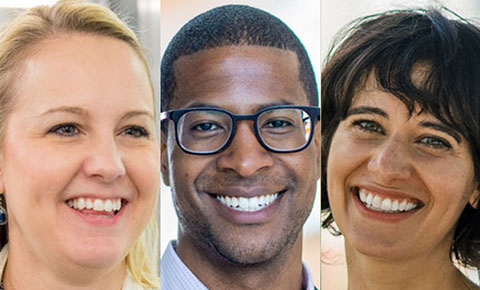When Education Research Benefits Both Sides

Research partnerships between universities and school districts need to be mutually beneficial, long term, and thoughtfully structured, Northwestern University researchers said during the annual meeting of the Mindset Scholars Network.
In a session called “Exploring Practice-Response Research,” School of Education and Social Policy professors Mesmin Destin and Simone Ispa-Landa discussed what they’ve learned about partnering with school districts and offered advice on bridging research and practice.
The conversation, moderated by Amy Pratt, assistant dean at the School of Education and Social Policy’s Office of Community Education Partnerships, focused on strategic ways to make research useful and responsive, whether as part of a research practice proposal or a lab study.
Research practice partnerships are long term collaborations–rather than one-off projects–that benefit both researchers and school districts, according to a working definition first put forth in 2013 by SESP’s Cynthia E. Coburn, professor of education and social policy, and her coauthors.
The goal is to use research findings to improve problems that school districts and the surrounding community are grappling with while simultaneously meeting the needs of the researchers. Too often, researchers are seen as pursuing esoteric concepts with little relevance. Or the school district's need doesn't match the researchers' expertise.
“There has to be a continuous motive for me to keep working on [a project] that's intellectual,” Ispa-Landa said. “And our partners need to feel like they're really going to get something out of whatever answers I can provide, because the research is often hard and challenging.”
The hurdles run the gamut, from mismatched timelines between researchers and practitioners to complex school- and district-level politics, confidentiality concerns, and transitions in district and university leadership.
But district leadership transitions, while disruptive, can also be an opportunity, in that new staff are often eager to learn about and be involved in ongoing projects, Ispa-Landa said.
Destin recommended building relationships with district staff beyond the person leading the project. That way, if a key staffer leaves, “the district will know your name and have a sense of what you were doing, and you can regain momentum.” Networking in general can lead to informal communication channels and new perspectives that shape questions the researchers ask.
Destin and Ispa-Landa are both part of a research practice partnership called the Northwestern Evanston Education Research Alliance, or NEERA. The partnership is unusual because it is supported by extensive infrastructure –the Office of Community Education Partnerships– and the team focuses on matching the issue prioritized by the district with scholars who are interested in pursuing the topics.
Destin, associate professor of psychology and of human development and social policy, studies how young people perceive themselves and pursue their futures. He also looks at social and institutional influences on motivation, well-being, and educational trajectories of lower socioeconomic status and first-generation college students.
Ispa-Landa studies how race, gender and inequality are linked in schools and criminal justice settings. She in particularly interested in how people respond to stigma and discrimination, including how they overcome it and how they navigate systems that support it.
Key takeaways from the discussion follow:
Advocate for the supporting infrastructure. “Universities are going to be called upon to demonstrate the value of the work they're doing and the connection it has to real issues,” Destin said. “Advocating for those types of supports or at least talking about it to people who might have the power can go a longer way than you might expect.”
Before starting a project, think about it holistically. “This will help determine the pieces you need to get at your question, where it makes the most sense to bring in a partner that might be investing something, and how you can you do it quickly to give something back,” Destin said.
Offer low hanging fruit: Ispa-landa shares preliminary research findings that could potentially improve the way schools operate with people who have the power to change things. This can “feed that desire for findings,” she said. “In those meetings about ongoing or preliminary findings, I might get ideas and we talk about next steps together in a really collaborative way.”
Follow up: Partnering with school districts means more than making recommendations and walking away, Destin says. Researchers need to come back and say, ‘here's what I found; here's why it's interesting; here's what I think it means.’ From there, continuing building the relationships. “It's been shocking how many different partners have said they've never had a researcher even come back and say what they found,” Destin said.
Think big—and small. Destin is studying how middle school kids think about the future and develop identities. His team created visual materials that the students and staff continue to use. “Obviously it’s great to see huge system level change,” Destin said, “but I like to see things at our partner level schools or in the community that are quickly taken up in an effective way."
Use an “apprenticeship model” to help graduate students learn how to lead meetings and communicate with district partners. “I enjoy just being creative and being scrappy and talking to people,” Destin said. “Maintaining some of that for graduate students to give them a little bit of an entree helps encourage them to use their own creativity and build relationships."
Both Destin and Ispa-Landa added that structures that support research-practice partnerships and other practice-responsive scholarship are essential. For universities newer to the work, “hire somebody–a designated person–if you can’t start a whole office,” Destin said.
Ispa-Landa agreed. “It's been really helpful to have someone who really knows the ins and outs of a particular district and how they prefer to work with researchers because that can vary hugely too,” she said.
Watch this clip to hear how Destin and Ispa-Landa define "practice-responsive research."